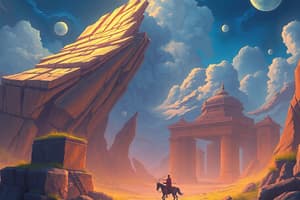Podcast
Questions and Answers
Which characteristic distinguishes the 'modern state' from states throughout human history?
Which characteristic distinguishes the 'modern state' from states throughout human history?
- Having a defined territory and population.
- The existence of a political community
- Having a system of government and laws.
- Universal sovereignty and the claim to universality. (correct)
According to social contract theory, what is a primary justification for the existence of states?
According to social contract theory, what is a primary justification for the existence of states?
- To ensure the dominance of a particular culture or ethnicity.
- To correct for market failures, provide public goods and services, and to maintain rule of law. (correct)
- To facilitate international trade and economic growth for privateers and other such actors.
- To provide a framework for individual self-reliance and independence.
Which of the following best describes the concept of 'state capacity'?
Which of the following best describes the concept of 'state capacity'?
- The ability of a state to effectively fulfill its essential functions and achieve its goals. (correct)
- The amount of natural resources a state possesses.
- A state's geographic size and population.
- The degree to which a state is recognized by other states in the international community.
How did the Peace of Westphalia (1648) influence the development of the modern state system?
How did the Peace of Westphalia (1648) influence the development of the modern state system?
Which of the following is a defining characteristic of colonialism?
Which of the following is a defining characteristic of colonialism?
Which of the following best describes the concept of 'globalization'?
Which of the following best describes the concept of 'globalization'?
Why is globalization considered an 'uneven' process?
Why is globalization considered an 'uneven' process?
How do international non-governmental organizations (INGOs) relate to global civil society?
How do international non-governmental organizations (INGOs) relate to global civil society?
Which of the following is a potential benefit of globalization?
Which of the following is a potential benefit of globalization?
In the context of globalization, what is a potential problem?
In the context of globalization, what is a potential problem?
Which of the following statements best captures the definition of 'nation'?
Which of the following statements best captures the definition of 'nation'?
What is the core belief underlying nationalism?
What is the core belief underlying nationalism?
Which statement accurately describes the relationship between nationalism and historical events?
Which statement accurately describes the relationship between nationalism and historical events?
Which of the following represents a potential positive aspect of nationalism?
Which of the following represents a potential positive aspect of nationalism?
Which of the following is a potential negative dimension of nationalism?
Which of the following is a potential negative dimension of nationalism?
A nation-state is characterized by what?
A nation-state is characterized by what?
What characterizes 'uneven globalization'?
What characterizes 'uneven globalization'?
Which factor is least associated with state failure stemming from the effects of colonialism?
Which factor is least associated with state failure stemming from the effects of colonialism?
What is meant by 'time-space compression' in the context of globalization?
What is meant by 'time-space compression' in the context of globalization?
Aside from multinational corporations, what is one other non-state actor driving globalization?
Aside from multinational corporations, what is one other non-state actor driving globalization?
Flashcards
What is the 'modern state'?
What is the 'modern state'?
Self-governing political organization with centralized authority and recognized sovereignty.
What is state capacity?
What is state capacity?
The ability of a state to effectively carry out its essential functions.
What is a weak state?
What is a weak state?
A state with a low capacity to perform its core functions effectively.
What is a failed state?
What is a failed state?
Signup and view all the flashcards
What is the Peace of Westphalia?
What is the Peace of Westphalia?
Signup and view all the flashcards
What is colonialism?
What is colonialism?
Signup and view all the flashcards
What is Globalization?
What is Globalization?
Signup and view all the flashcards
What are INGOs?
What are INGOs?
Signup and view all the flashcards
What is a nation?
What is a nation?
Signup and view all the flashcards
What is nationalism?
What is nationalism?
Signup and view all the flashcards
What is a nation-state?
What is a nation-state?
Signup and view all the flashcards
Study Notes
The State & The Modern State
- The state is a political community
- States have existed throughout human history
- Modern states are distinguished by universality and sovereignty
- Modern states also include a territory, a population and a government
- Sovereignty is the right to self-determination
- Sovereignty includes internal sovereignty, which is centralized authority with a monopoly on the use of force, and external sovereignty which is recognition
Why States
- States exist because of social contract theory (Hobbes, Locke, Kant)
- The functions of states include:
- Defense
- Facilitating collective action
- Controlling violence and policing
- Taxation
- Maintaining the rule of law
- Providing public goods
- Administrative roles
- Correcting for market failures
State Capacity & 'Failed' States
- State capacity is the ability of a state to achieve its functions
- Weak states have low capacity
- Failed states cannot perform their basic functions, as shown in the Fragile States Index
- Factors of state failure are linked to the effects of colonialism, conflict/war, political instability, economic underdevelopment, lawlessness, ethnic/cultural divides, etc.
The Birth of the 'Westphalian' State & The Inter-State System
- The 1648 Peace of Westphalia marked the end of the Thirty Years' War
- The Peace of Westphalia established the notion of state sovereignty
- The inter-state (international) system is institutions and patterns of relations between modern sovereign states
Colonialism & The Universal Imposition of the State
- Colonialism is where a state power assumes direct political and territorial control over another territory and society
- Modern European colonialism occurred between 1493 and 1914
- Characteristics of Colonialism:
- Extractive
- Autocratic
- Coercive
- Inequality
- Imposition of European institutions, market systems, and ideologies
- Politicization of identities
'Globalization'
- Globalization is the increasing economic, political and social integration throughout the world
- Globalization is a “complex, multidimensional force"
- Globalization is synonymous with time-space compression
Globalization in the Modern Era
- Modern globalization has the characteristics of:
- Unprecedented speed of integration
- Technological advances
- Economic liberalization
- Government policy
- ‘Uneven globalization’ refers to the unequal distribution of benefits and costs of globalization, particularly between the Global North and Global South
Globalization & Non-State Actors
- Global Civil Society is the realm of values, institutions, organizations, networks and individuals, independent from the state and the market, that operate internationally
- Value-driven actors aim to influence the world
- International non-governmental organizations (INGOs) are formal, organized manifestations of global civil society
- Transnational movements are less organized and are politically driven international movements
- Market based for-profit private sector actors are multinational corporations
The Globalization Debate
- Benefits of globalization:
- Decreases sources of potential conflict through interdependence
- Increases prospects for economic growth and democracy
- Increases cross-cultural contacts
- Problems of globalization:
- May hinder democracy and economic growth
- Unequal distribution of benefits
- Disempowers the working class
Nationalism
- A nation is a group of people who share a culture, history, a sense of community and a desire for self-government, which are nations are ideas
- Nationalism is the belief that the nation is the ultimate basis of political identity and is an ideology
- A nation-state the overlap of a pre-existing nation and a modern state
Nationalism: Trends
- Many believed that nationalism would come to an end in numerous eras
- The end of the Cold War saw a wave of nationalism
- More recently, nationalism has become more relevant in politics (Bieber, 2018)
- Covid-19 played a role in driving up nationalism
The Different Faces of Nationalism
- Positive dimensions of nationalism:
- Offers a political community
- Can promote democracy
- Can discourage imperialism and promotes independence
- Can promote economic growth
- Negative dimensions of nationalism:
- Has catalyzed conflict
- A source of differentiation
- A source of parochialism, xenophobia, nativism and discrimination
- Can promote imperialism
Studying That Suits You
Use AI to generate personalized quizzes and flashcards to suit your learning preferences.




